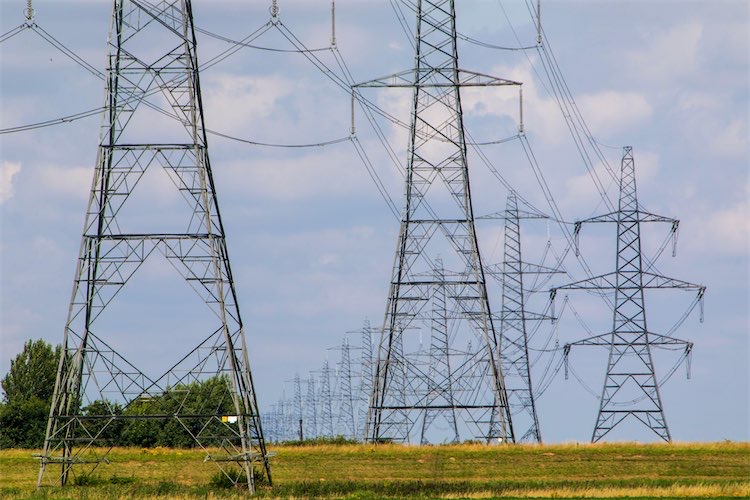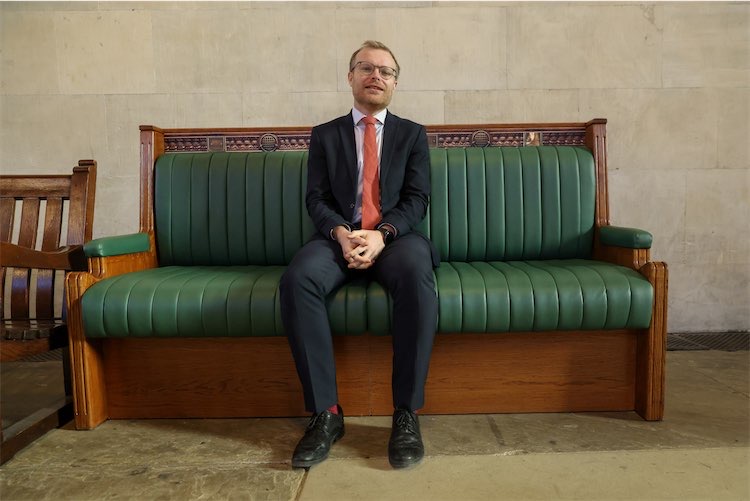Residents Near New Pylons Could Get Money Off Bills, Says Energy Minister
Scottish Labour MP Michael Shanks was appointed energy minister last July (Photography: Dinendra Haria)
6 min read
As government tries to make Britain a “clean energy superpower”, minister Michael Shanks told Zoe Crowther that extended ‘pounds for pylons’ schemes could be soon coming down the track.
Across its key missions for government, the Labour administration has touted the clean energy transition as representing a huge opportunity to generate economic growth. Proposals for a new, publicly owned, clean energy company, Great British Energy, promise to cut bills for the public, further the UK’s energy independence, and create 650,000 new “high-quality” jobs.
However, with these plans requiring the building of significant infrastructure across the UK, one of the biggest challenges will be gaining local support for these energy projects.
Speaking to The House, energy minister Shanks revealed the government will have “more to say” in the coming months about giving local residents money off their energy bills in return for pylons built in their area.
Shanks was first elected as an MP in the Rutherglen and Hamilton West by-election in October 2023. Only eight months later, he was appointed as parliamentary under-secretary of state for energy to work alongside Secretary of State for Energy Security and Net Zero Ed Miliband.
Having previously served as a shadow minister for Scotland, Shanks was enthusiastic about the opportunities that clean energy could bring for people across the entire UK.
But in December, the UK Energy Research Centre (UKERC) said there would be “very little room for error” in meeting the government’s plan to create a 95 per cent low-carbon electricity grid by 2030.
“Policymakers face significant challenges both in delivering clean power within the timeline the government desires and doing so in a way that ensures consumers benefit,’’ researchers said.
This is why Shanks was so keen to highlight potential benefits for communities.
“What I'm really determined to do is build the infrastructure we need for the future, but also wherever we can bring communities with us,” he said.
“That's why we've been looking at things like if we're going to build transmission infrastructure and pylons, maybe you should get some money off your bills for hosting that on behalf of the country.
“If you host really critical infrastructure for the country, you're doing the country a favour… you should feel some benefit from that. The fundamental for me is people want to see action on this, and this is what we need to do to deliver energy security and to tackle climate change.”
Long term change means it's not going to happen overnight
The concept of ‘pounds for pylons’ has long been discussed, with one consultation under the previous Conservative government recommending £1,000 annual bill discounts for residents living near newly-built pylons. However, these plans have not yet been implemented and Shanks previously called such schemes “tokenistic”, suggesting that any new proposals should extend to “wider” community benefits beyond just a discount.
The energy minister told The House that some good community benefit schemes had been implemented under the previous government, in particular around onshore wind.
“But those aren't universal across all technologies,” he said, pointing to solar projects and network infrastructure as examples where community benefits could be improved. Shanks said the work he has been doing on the solar taskforce has been about “driving forward” these community benefits.
He added that the government wants to “shift” towards the public directly benefiting from “big schemes” like pylons and electricity substations.
 The building of pylons often meets resistance by local communities and landowners (Alamy)
The building of pylons often meets resistance by local communities and landowners (Alamy)
The long-term goal of the government’s energy policies will be to bring prices down – but Shanks admitted “long-term change means it's not going to happen overnight”. He was unable to put a time frame on when the public might feel a difference in their energy bills.
“We know that the clean power system we want to build is cheaper to run than the alternative, and delivers energy security as well,” he said.
“The increases in the price cap that we've seen since we came into power actually underline how important this is, because if we stay on the path that we're on at the moment, that price cap is just going to keep going up and up and up because we're exposed to the volatile fossil fuel prices.”
There is continued debate in the energy industry over whether a locational pricing system should be introduced in the UK where people’s energy prices would depend on where they live. On this, Shanks confirmed the government has not yet made a decision, but expects to reach a conclusion by the “middle” of this year.
“The electricity market in this country is based on a system that had a handful of fossil fuel power generation stations, broadly next to where population centres were,” he said. “That has shifted and will continue to shift massively. So we know there's a need for market reform.”
The government is absolutely committed to supply chains being in the UK
In an interview with The House, National Grid’s president of UK electricity transmission Alice Delahunty suggested that the government should intervene to advance certain energy infrastructure projects, such as new overhead lines, substations and underground cables, more quickly.
“There’s still space to bring in more acceleration there, potentially in the medium to longer term,” she said.
Asked whether this was on table, Shanks replied that the government “isn't going to get involved in second guessing decisions that are made within the planning process”.
“We're not trying to push through projects to a success point. We just want decisions to be made far more quickly, so that these things aren't caught up for years on end.”
 Energy minister Michael Shanks wants people to feel the benefit of "hosting" pylons in their areas (Photography: Dinendra Haria)
Energy minister Michael Shanks wants people to feel the benefit of "hosting" pylons in their areas (Photography: Dinendra Haria)
The minister suggested a number of decisions concerning UK nuclear projects should soon be expected, claiming nuclear will play a “huge role” in jobs and skills across the country. A proposed new nuclear power plant, Sizewell C, received an additional £2.7bn in funding in the 2024 Budget and the upcoming government spending review will decide its final investment.
Technology providers are also awaiting a decision on which small modular reactors (SMRs) will be given government support. Shanks said he cannot comment on this process, but that it was "a really exciting technology, with a real export potential as well".
“Britain could lead the way in some of this,” he continued. “These are huge spending commitments for the government to make, it's right that we look really carefully at them.”
This year, the government is also planning to hold its biggest-ever renewable energy subsidy auction, in an attempt to meet the government’s fast-approaching target for clean power by 2030.
Shanks described this auction as “critical”, but said he wanted to emphasise that supply chains should be in this country. "I called a whole load of developers this week to reiterate that the government is absolutely committed to supply chains being in the UK,” he said.
“For ministers to really emphasise the point that it matters to us where these projects are constructed, is quite a novel thing in the UK, and it shouldn't be. Our emphasis is, yes, we want these projects to come through the contracts for difference options, but your supply chain should be in the UK as much as possible, giving skills and jobs to people in industrial communities right across the UK.”
